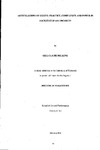Articulations of equity: practice, complexity and power in facilitated art projects
| dc.contributor.author | MELLING, GILL CLAIRE | |
| dc.contributor.other | Faculty of Arts, Humanities and Business | en_US |
| dc.date.accessioned | 2013-10-25T10:27:41Z | |
| dc.date.available | 2013-10-25T10:27:41Z | |
| dc.date.issued | 2006 | |
| dc.identifier | NOT AVAILABLE | en_US |
| dc.identifier.uri | http://hdl.handle.net/10026.1/2373 | |
| dc.description | Merged with duplicate record 10026.1/732 on 28.02.2017 by CS (TIS) | |
| dc.description.abstract |
This is a practice-based research project which analysis how democracy and facilitation are articulated within two different social contexts. The purpose of this research is to make apparent, through two facilitated art projects- the Elder Flowers project and the Exwick Image Project - the contingency of meanings and methods of making democratic choice with participants. The argument is that my methods of facilitation, which embrace social and cognitive difference by 'attending to' (that is, using methods of empathic listening and responsive action), their outcomes and meanings are contingent to each specific interaction. These acts of creative facilitation ask new questions of how democratic choice can be made between people who are located within multiple (historical, emotional, familial, economic) power dynamics. The thesis uses theories of complexity and difference to articulate: the need to 'frame' meanings in order for facilitator and participants to understand each other's choices and the fluidity of signification and subjectivity that deconstructs the ability to fix meaning and therefore properly understand each other. A conflict is revealed within the objective of facilitating a project in a democratic manner. This is a conflict between acknowledging that choice will emerge through interaction between facilitator and participant, and the facilitator needing to index - make sense of - what is happening in order to develop the facilitation. Additionally, the democracy of representing the complexity of the facilitations, in the 'framed' form of project record within the PhD submission, is questioned. A series of practical experiments, explore how theoretical concepts of presentation can work with project material and how an intuitive approach to the project material can reveal the complexity of choice-making during the facilitations. | en_US |
| dc.language.iso | en | en_US |
| dc.publisher | University of Plymouth | en_US |
| dc.title | Articulations of equity: practice, complexity and power in facilitated art projects | en_US |
| dc.type | Thesis | |
| dc.identifier.doi | http://dx.doi.org/10.24382/3793 |
Files in this item
This item appears in the following Collection(s)
-
01 Research Theses Main Collection
Research Theses Main


